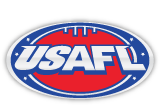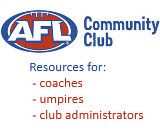Steps to Starting a Club
|
|
1. Network
Talk to the USAFL, your mates, anyone and do a bit of networking to find out if there is anyone known out there that shares your passion to help you start your club.
2. Get the Word Out
Get onto Facebook, Twitter, Sportsvite or other social network sites. Create a presence for your new club online and start searching for other footy fans and athletes in your area. All these networking sites allow you to do this.
Look for other places to advertise for free. These could include:
- a local college campus
- community center
- bars and pubs
- your apartment complex
- YMCA’s and other fitness centers
- other local sporting fields, gyms and hangouts
- coffee shops
3. Hold an Event
The event could be a social night at a bar or venue where you have access to a television and can show some footy. You could also just arrange a kick in the park.
4. Recruit
With your new found mates, why not hold recruitment pub-crawl or attend a local event which might attract like-minded sports fans.
5. Complete USAFL Club Registration
- Once you have a core group of members, you can start to get organized. You will need to contact the Communications Manager at office@usafl.com and complete the following items:
- Decide upon and submit a club name and club jumper design, for Board approval.
- Sign the USAFL Constitution. See Appendix for copy of constitution.
- Pay applicable USAFL Club Fees (free for first year). Clubs must pay dues to be covered under USAFL insurance policy.
-
Club dues vary from year to year. Generally however, they do not change. Clubs are classified into the following categories:
o A ($450 per year);
o B ($250);
o C ($50); and
o Developmental depending on their degree of evolution. - Any changes to rates will be finalized at the Board Retreat each February.
- Arrange for liability insurance. Clubs who are up to date on their dues are the only ones allowed to receive insurance certificates. Also, the USAFL only provides insurance for registered USAFL clubs, no one else.
- Clubs will be covered under third party liability for all practices, games, tournaments and nationals.
-
When a club requests an insurance certificate the following information is required:
1. Name of Club - Advise if the owner/certificate holder or some other entity needs to be included as an Additional Insured including any specific wording. Send Communications Manager a copy of their insurance requirements, if available.
2. Name of field
3. Name and address of the field's owner
4. Directions on where/how you want it sent including a fax # or email address - Once the Operations Manager receives this information an insurance certificate can be requested from USAFL’s insurance provider. Once the certificate is received back the Operations Manager will make sure the club gets a copy and file a copy in USAFL records.
- File for 501 (c) 3 status, see Appendix for instructions.
- Set the club up with a website, Facebook account or other tools. Contact Communications Manager if you need help setting up a website.
6. Get Equipped
Equip yourselves with footballs, jumpers, cones, goal posts and other equipment. Footballs and jumpers can be ordered through the Communications Manager. The USAFL will generally be able to provide you with some free, used footballs (usually nationals balls) to get you going and loan a set of jerseys if needed. See Goal Post Assembly Instructions on Game Day p. 3 - 4 and Scoreboard Assembly on p. 8 for required materials.
7. Have a Kick
Book fields with your local Parks and Recreation office to hold practices and games. It can take some time to gather enough members to start playing a game, but stick with it; your new club is out there and waiting!
Many clubs have developed alternative styles of competition as a way of attracting new players. Local Metro League competitions (9 a-side) have arisen to accommodate the increasing number of players who enjoy participation in the sport on a recreational basis. This concept allows players to enjoy the sport without the rigors and financial burden of regional travel of senior club competitions. These metro leagues typically consist of several teams of 10-15 players each competing at a recreational to highly skilled level. The standard laws of football are observed, though minor modification of the rules may be implemented in order to accommodate the desired style and skill level of play. Women’s clubs have also become an increasing presence in the United States with 8 women’s teams participating at the 2009 USAFL National Championship tournament. An exciting new development has been that of a co-ed, modified game which was adopted by several teams in 2008. The response to co-ed has been terrific, with players enthusiastic about continuing to participate in that league and move on to playing regular Australian Football games.
|
|
|





